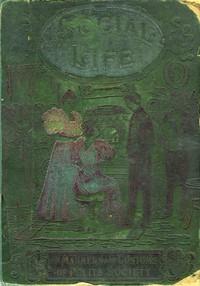Read this ebook for free! No credit card needed, absolutely nothing to pay.
Words: 40177 in 12 pages
This is an ebook sharing website. You can read the uploaded ebooks for free here. No credit cards needed, nothing to pay. If you want to own a digital copy of the ebook, or want to read offline with your favorite ebook-reader, then you can choose to buy and download the ebook.


: Miss Grantley's Girls and the Stories She Told Them by Archer Thomas - Conduct of life Juvenile fiction; Children Conduct of life Juvenile fiction; Siblings Juvenile fiction; Students Juvenile fiction; Teachers Juvenile fiction; Storytelling Juvenile ficti
CHAP. Page
MISS GRANTLEY'S GIRLS,
AND THE STORIES SHE TOLD THEM.
OUR GOVERNESS.
THERE was nothing romantic in Miss Grantley's appearance, and yet she was the sort of person that you could not help looking at again and again if you once saw her. She was not very young, nor was she middle-aged--about thirty, perhaps. She was certainly not what is called a beauty, but she was not in the least plain. She was what some people would call "superior looking" or "rather remarkable," and yet they would not be able to say why she attracted attention. She was very little taller than Marion Cooper, who was the tallest of the girls in our first class; but yet she gave one the impression of being rather above the middle height, because she walked so well and moved in that easy graceful manner which belongs to a person who, as the old housekeeper at the school used to say, "was born and bred a lady." There is no way of describing her; though Annie Bowers, who could draw beautifully, made several pencil sketches that were wonderful likenesses. Her hair, fine, soft, and wavy, was dark chestnut, with that warm brown tinge that looks so well with a rather pale creamy complexion; her features were regular, her eyes of that strange gray that looks dark at night and steel-blue in the sunshine--eyes that seemed to see into one's thoughts, and would have been severe except for the smile that flitted about her clear well-cut mouth whenever anything humorous happened, or a pleasant thought was passing through her mind. She always looked well-dressed, though she wore silver-gray alpaca or dark brown merino in school, and rather plain black or gray silk when she went visiting. But there was mostly a rose or some other flower in her silver brooch, and the lace that she sometimes wore at her neck and wrists was so fine and elegant that Mrs. Durand, who was the widow of a general officer and had been educated at a convent, declared it was very valuable indeed, and never was made in England. Somebody, speaking once of Miss Grantley's appearance, compared her to fine old china; and she had just that clear unsullied nice look that reminded you of an old china figure, though there was nothing particularly old-fashioned about her. She had some very pretty old-fashioned things, though--quaint ivory carvings and porcelain bowls, and a delightful old tea-set, and some old plate of that dark-looking silver that always seems to have a deep shadow lying under its smooth shining surface. She was something like that silver, too; for though she was bright and pleasant and with a constant liking for fun, there was a great deal of gravity beneath her smile. No one could have treated her with familiar levity, though she was gentle and sweet-tempered; for no one who had seen her very rare expression of deep displeasure would care to provoke it. Of course I am chiefly speaking now of our girls, but I think other people--grown-up and important people--thought much the same as we did of Miss Grantley. The truth was, nobody thought of her except with kindly feelings, because everybody liked her. She had gone through much trouble. Her father, who had been a wealthy squire, lost all his money in buying shares in mines, or something of that sort, and died a poor man. His wife had been dead for years, so that Miss Grantley was left an orphan and with few relations except one brother, who had gone abroad to seek his fortune, but without finding it, I suppose, since Miss Grantley, after passing examinations and being a teacher in a great school in London, came down to Barton Vale to be our governess.
Barton Vale is a pretty, quiet, secluded place. It is not exactly a village, but is a suburb of a large town, only the town is nearly two miles away, so that the Barton Vale people heard very little of the factory people, and didn't smell the smoke from the tanneries and the alkali works at Barton-on-the-Lees. In fact most of the principal people of the town had come to live about the vale. The vicar, and the principal manufacturers, the Jorrings, who were county people, and Mr. Belfort the banker, and Mrs. Durand, and the Selways, and old Dr. Speight, and the Norburys, had handsome houses and kept their carriages. Even the Barton doctor, Mr. Torridge, was more in the vale than in the town; and the solicitor had a pretty little villa next door to the old-fashioned house that Miss Grantley had taken to open a school in.
Most of these folks knew Miss Grantley; and many of them loved her as much as her girls did, for some of the girls belonged to the families I have mentioned. They came to her school as daily pupils instead of being sent to the cathedral town to live away from home; and that was one reason that she got on so well, for the dear old vicar and his wife had known her parents, and would have liked her to make the vicarage her home. The banker's married daughter, Mrs. Norbury, had been a schoolfellow of Miss Grantley, and called her "dear Bessie" when they met, and wanted to take lessons of her in French and German; because Miss Grantley had studied abroad, and spoke both these languages very well.
It was because so many people there and in the town and in London, knew her, that she was able to take the old house which was once the maltster's, and have it done up nicely, and the great long room that had been the front office and sample-room turned into a school-room, and the pretty little parlour fitted with French windows, that it might open to the garden full of rose-bushes and standard apple-trees, and with its red brick walls covered with plums and jessamine. She began with nine young girls whom she brought with her as boarders, and five more soon came, so that she had fourteen in the house, and three more little ones as day-boarders , and eight of us seniors, who went for lessons from ten to one, an hour for lunch, and then home at four to late dinner.
It was of course a good thing for Miss Grantley that she had her own old nurse there for cook and housekeeper, with a strong girl to do the housework, and a woman from one of the cottages at Vale Farm to help twice a week. The solicitor's villa had a large garden, and the gardener and his wife lived in the cottage which had once belonged to the maltster's foreman at the end of the orchard and close to the old kiln, so they were always ready to help too; and our governess had very little to pay for gardening except a few shillings for a labourer now and then. You may very well believe, then, that Lindley House School was a very pleasant place. Miss Grantley called it Lindley House because, she said, old-fashioned people always connected the idea of education with Lindley Murray's Grammar--not that she taught grammar from Lindley Murray's book, for she declared the way of teaching was quite different now, and that there were a good many queer rules in the old grammar which could only be accounted for by the fact that the old gentleman who wrote it lived for many years chiefly on boiled mutton and turnips!
Oh!--I have forgotten about Mrs. Parmigan! She was a dear old thing; had actually been nursery governess to Miss Grantley; and, having married and been left a widow, had heard of her former pupil and young mistress being left fatherless and motherless, and now brought her small annuity to Barton Vale, and helped to teach in the school and to be a sort of mother to Miss Grantley, without wanting any wages, and only just her board and lodging, beside which she could afford to pay for a good many things towards the housekeeping.
She used to teach the juniors, and taught them well too, though some of them were occasionally spoiled; and as it was very often somebody's birthday, seed-cake and gingerbread and lemon toffee were more common than they are in most schools. Even the senior girls came in for some of the goodies, and used to say that, as they lived in a world where somebody was born every minute, it would be hard if they couldn't keep a birthday once a week.
But this saying reminds me that we might go on gossiping about our governess for the hour together, and yet not get to the stories that she used to tell us. It was one of her delightful plans to devote an afternoon in each week to fancy needlework; and we used to take our work with us on that day, and instead of going home to dinner we had luncheon and stayed as her guests to tea, with cake or home-made bread and butter, jam, or in summer, ripe plums and apples from the garden, or plates of strawberries and cream from Ivory Farm.
Free books android app tbrJar TBR JAR Read Free books online gutenberg
More posts by @FreeBooks


: Latin Pronunciation: A Short Exposition of the Roman Method by Peck Harry Thurston - Latin language Pronunciation







